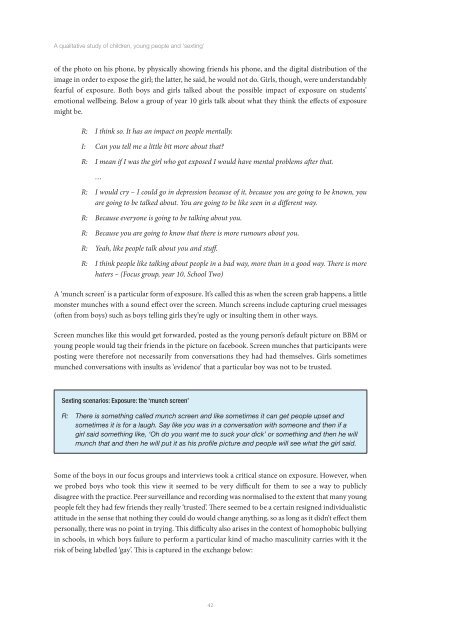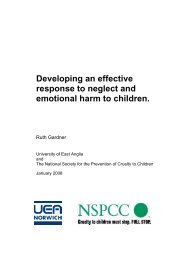A qualitative study of children, young people and 'sexting ... - NSPCC
A qualitative study of children, young people and 'sexting ... - NSPCC
A qualitative study of children, young people and 'sexting ... - NSPCC
You also want an ePaper? Increase the reach of your titles
YUMPU automatically turns print PDFs into web optimized ePapers that Google loves.
A <strong>qualitative</strong> <strong>study</strong> <strong>of</strong> <strong>children</strong>, <strong>young</strong> <strong>people</strong> <strong>and</strong> ‘sexting’<br />
<strong>of</strong> the photo on his phone, by physically showing friends his phone, <strong>and</strong> the digital distribution <strong>of</strong> the<br />
image in order to expose the girl; the latter, he said, he would not do. Girls, though, were underst<strong>and</strong>ably<br />
fearful <strong>of</strong> exposure. Both boys <strong>and</strong> girls talked about the possible impact <strong>of</strong> exposure on students’<br />
emotional wellbeing. Below a group <strong>of</strong> year 10 girls talk about what they think the effects <strong>of</strong> exposure<br />
might be.<br />
R: I think so. It has an impact on <strong>people</strong> mentally.<br />
I: Can you tell me a little bit more about that?<br />
R: I mean if I was the girl who got exposed I would have mental problems after that.<br />
…<br />
R: I would cry – I could go in depression because <strong>of</strong> it, because you are going to be known, you<br />
are going to be talked about. You are going to be like seen in a different way.<br />
R: Because everyone is going to be talking about you.<br />
R: Because you are going to know that there is more rumours about you.<br />
R: Yeah, like <strong>people</strong> talk about you <strong>and</strong> stuff.<br />
R: I think <strong>people</strong> like talking about <strong>people</strong> in a bad way, more than in a good way. There is more<br />
haters – (Focus group, year 10, School Two)<br />
A ‘munch screen’ is a particular form <strong>of</strong> exposure. It’s called this as when the screen grab happens, a little<br />
monster munches with a sound effect over the screen. Munch screens include capturing cruel messages<br />
(<strong>of</strong>ten from boys) such as boys telling girls they’re ugly or insulting them in other ways.<br />
Screen munches like this would get forwarded, posted as the <strong>young</strong> person’s default picture on BBM or<br />
<strong>young</strong> <strong>people</strong> would tag their friends in the picture on facebook. Screen munches that participants were<br />
posting were therefore not necessarily from conversations they had had themselves. Girls sometimes<br />
munched conversations with insults as ‘evidence’ that a particular boy was not to be trusted.<br />
Sexting scenarios: Exposure: the ‘munch screen’<br />
R: There is something called munch screen <strong>and</strong> like sometimes it can get <strong>people</strong> upset <strong>and</strong><br />
sometimes it is for a laugh. Say like you was in a conversation with someone <strong>and</strong> then if a<br />
girl said something like, ‘Oh do you want me to suck your dick’ or something <strong>and</strong> then he will<br />
munch that <strong>and</strong> then he will put it as his pr<strong>of</strong>ile picture <strong>and</strong> <strong>people</strong> will see what the girl said.<br />
Some <strong>of</strong> the boys in our focus groups <strong>and</strong> interviews took a critical stance on exposure. However, when<br />
we probed boys who took this view it seemed to be very difficult for them to see a way to publicly<br />
disagree with the practice. Peer surveillance <strong>and</strong> recording was normalised to the extent that many <strong>young</strong><br />
<strong>people</strong> felt they had few friends they really ‘trusted’. There seemed to be a certain resigned individualistic<br />
attitude in the sense that nothing they could do would change anything, so as long as it didn’t effect them<br />
personally, there was no point in trying. This difficulty also arises in the context <strong>of</strong> homophobic bullying<br />
in schools, in which boys failure to perform a particular kind <strong>of</strong> macho masculinity carries with it the<br />
risk <strong>of</strong> being labelled ‘gay’. This is captured in the exchange below:<br />
42
















